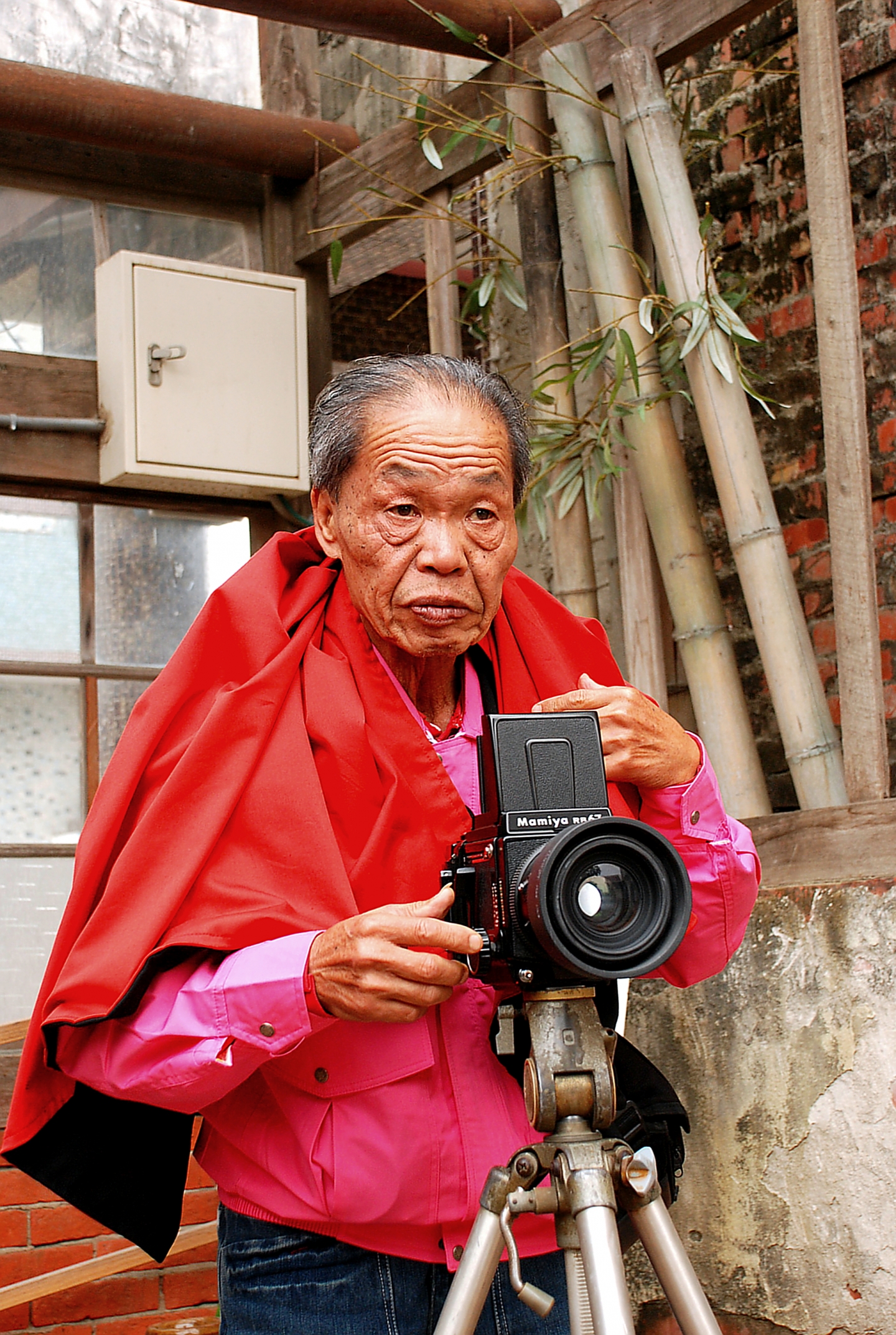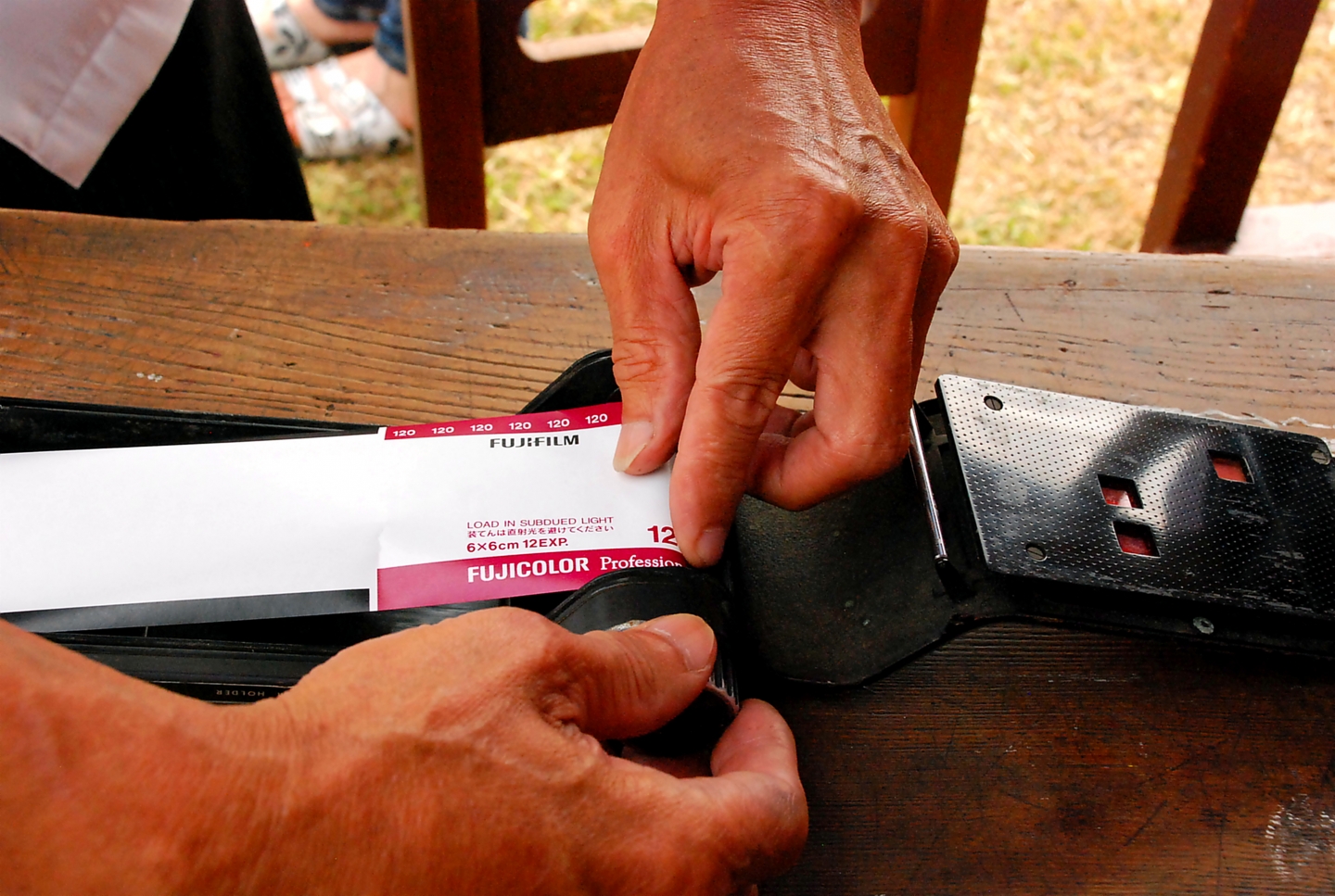
新奇龍照相館 / 劉豐文
在菁寮聚落的墨林文物館對面,新奇龍照相館的牆面上吊掛著幾幅黑白的老相片,其中有地方人士的大頭照、有家族生活照,而最吸引人的一張照片要算是相館老闆劉豐文與一臺老相機的合照了。在菁寮這樣古老的聚落裡遇到老攝影師,這樣的情景很容易讓人想起《村之寫真集》這部電影,電影描述日本一個偏遠山村,因為要興建水庫的緣故,村民不得不遷居他處,當地的鄉公所便邀請了在地的一位老攝影師幫每位村民拍照,老攝影師於是找回在都市工作的兒子跟他一起進行這項工作,因而發展出一連串關於鄉村開發以及人與人之間最單純真摯的情感故事。
有一陣子我常去找老攝影師討論這部電影動人的地方,並鼓勵他可以試著拍攝在地居民的肖像,雖然他說沒看過這部電影,不過他很有興趣重新拍攝一些黑白相片,於是我們相約了某些日子就真的扛著他的老相機,試著拍攝菁寮居民的日常。
我都暱稱他文哥的老攝影師,那台珍藏多年的120相機是年輕的時候他找人訂製的,這部老相機就這樣陪著文哥走過了無數個年頭,至今依舊功能不減當年的服役著,看到這樣的古董相機出動,你會打從心底深深感動著,隨著數位化的時代來臨,拍照幾乎已經變成一種大家都隨時可以進行的紀錄方式,可是也因著過於便利,所以大家對於傳統攝影師所重視的構圖、光影、神韻…等等構成一張好照片的要件已不太重視,因此在這個年代想要看到一張工工整整用心拍攝的人物肖像還真的有點困難。
當時我同文哥第一個設定拍攝的對象是村子裡的古蹟金德興藥鋪的主人─阮齊先生,他是地方上重要的耆老,平時很有威嚴,我們討論之後就是要拍出他的威嚴與認真,於是我搬來了一張太師椅,讓他坐在椅子上威嚴十足的睥睨群雄,我從120相機的景觀窗中看到了文哥嚴謹的構圖,我想我們都找到了我們想要的感覺,如今阮齊先生已於2017年過世遠行了,因而當時拍下的那張照片更是意義深刻。
因著老攝影師的緣故,聚落裡人跟人之間,那一段彷彿已經遺失的情感,我們透過相機又重新找了回來,而後續當然還有更多的對象與故事正等著我們慢慢去記錄!
Snapshot of Jingliao
Xinqilong Photo Studio / Liu Feng-Wen
Across the Molin Museum in the Jingliao settlement stands Xinqilong Photo Studio, where the walls are decorated with a handful of black-and-white photos. The photos include headshots from local famous people and family photos. The most intriguing photo is the photo of the owner, Liu Feng-Wen with an old camera. When you meet an old photographer in an old settlement like Jingliao, you will easily recall the film called Village Photobook. The film describes there is a remote mountain village in Japan. Since a reservoir is decided to be established there, the villagers must move somewhere else. The local town office invites a local old photographer to take a photo for every resident in the village. The old photographer then asks his son, who works in the city, to join and do this job together. Then the film continues to unfold a story about village development as well as the most pure and genuine affection among people.
There was a time when I frequently visited this old photographer and we would talk about the touching moments in this film. I encouraged him to try taking portraits of the local residents. Though he said he had not seen the film, he still developed an interest and began to take some black-and-white photos. Thus, we agreed one day and he indeed brought his camera to start taking the daily portraits of people in Jingliao.
I often intimately call this old photographer “Brother Wen.” The Camera 120 that he has kept for many years was custom-made when he was young. This old camera has been with Brother Wen for many years and has been functioning as if it were new. When you see an old camera like this, you will feel deeply impressed. With the arrival of the digital era, photography has become a way of recording that everyone can achieve at any time. Yet, due to this convenience, the crucial elements for a traditionally good photo is somehow lost, such as composition, shade, ambience, etc. As a result, it is actually quite difficult to find portraits that are neatly taken with great effort in this era.
At that time, the first person we set to take photos of was Juan Chi, who is the owner of the historic landmark in the village, Jindexin Herbal Medicine Shop. He was an influential elder in the neighborhood who carried great prestige. After our discussion, we decided to capture his prestige and earnestness. So I took a traditional wooden armchair, sat him on the chair and guided him to gaze distantly with great dignity. From the view window of the Camera 120, I sensed the Brother Wen’s exact composition. At that moment I realized that we both found the style we were searching for. Juan Chi passed away back in 2017, so the photo taken at that time is extraordinarily meaningful for now.
Because of the old photographer, we have retrieved the relationships among people in the settlement and the affections that seem to be lost for a while. Surely, there are more people and stories awaiting us in the future!
菁寮村の写真
新奇龍写真館 / 劉豊文
菁寮にある墨林文物館の向かいに位置する新奇龍写真館の壁には、何枚ものモノクロ写真が飾られている。地元の人の証明写真や家族生活の写真、中でも最も目を惹くのは、写真館オーナーの劉豊文と1台のカメラが収められた一枚だ。菁寮のような古い集落で年輩の写真家に出会うという状況に、『村の写真集』という映画を思い出す。舞台は日本のとある山村。ダムに沈む運命にある地元の町役場は、村の写真家に村人の写真撮影を依頼する。彼は都市で働く息子を呼び戻し、村人の写真を撮りに険しい山道を行く。一連の農村開発や人々の人間模様を綴るピュアで真摯な感動ストーリーだ。
ある時期、年輩写真家のところへ何度も足を運び、映画の感動的な部分について語ったり、地元の人の写真を撮るよう熱く勧めてみた。彼はこの映画を観たことはないものの、モノクロ写真で再度撮影することに興味を示し、実際に彼の古いカメラを持ちだして、一緒に菁寮住民の日常を写真に収めていくことにした。
「文さん」と僕たちが呼んでいる年輩写真家が持つ、歴史ある120フィルムカメラは、彼が若い頃に特注したもの。何十年にも渡って文さんに寄り添ってきたが、その機能は変わらず当時のままだ。こんなアンティークなカメラを目にすると、心の底から深く感動を覚える。デジタル化時代の到来とともに、写真を撮ることは誰もがいつでもできる記録方法になりつつあるが、その利便性ゆえに、伝統的な写真家が撮影時に重視する構図・光や影・神韻などには注意が払われなくなっている。つまり、今の時代に心を込めて注意深く撮影された写真を見るというのは、非常に難しいと言えるだろう。
そして、最初の被写体に選んだのは、村の古跡である金徳興薬局の主人・阮齊さん。彼は地元の重要な年長者で、とても威厳のある方だ。我々は彼の威厳さと真面目さを収めたく、太師椅子を持ってきて座ってもらうと、その威厳さがさらに発揮された。120フィルムカメラのレンズを通した、文さんの厳格な構図を見ると、我々が望んでいた感覚がしっかり掴めていると感じた。2017年に阮齊さんがこの世を去った今、その時に撮影した写真は更に意義のあるものとなっている。
年輩写真家とのご縁により、村人の間で失われたかに思われた感情をカメラを通して再び取り戻すことができた。そしてこれからも多くの被写体や物語がゆっくりと記録されるのを待っていることだろう!


 本站是採用全世界最先進的SSL 256bit 傳輸加密機制
本站是採用全世界最先進的SSL 256bit 傳輸加密機制